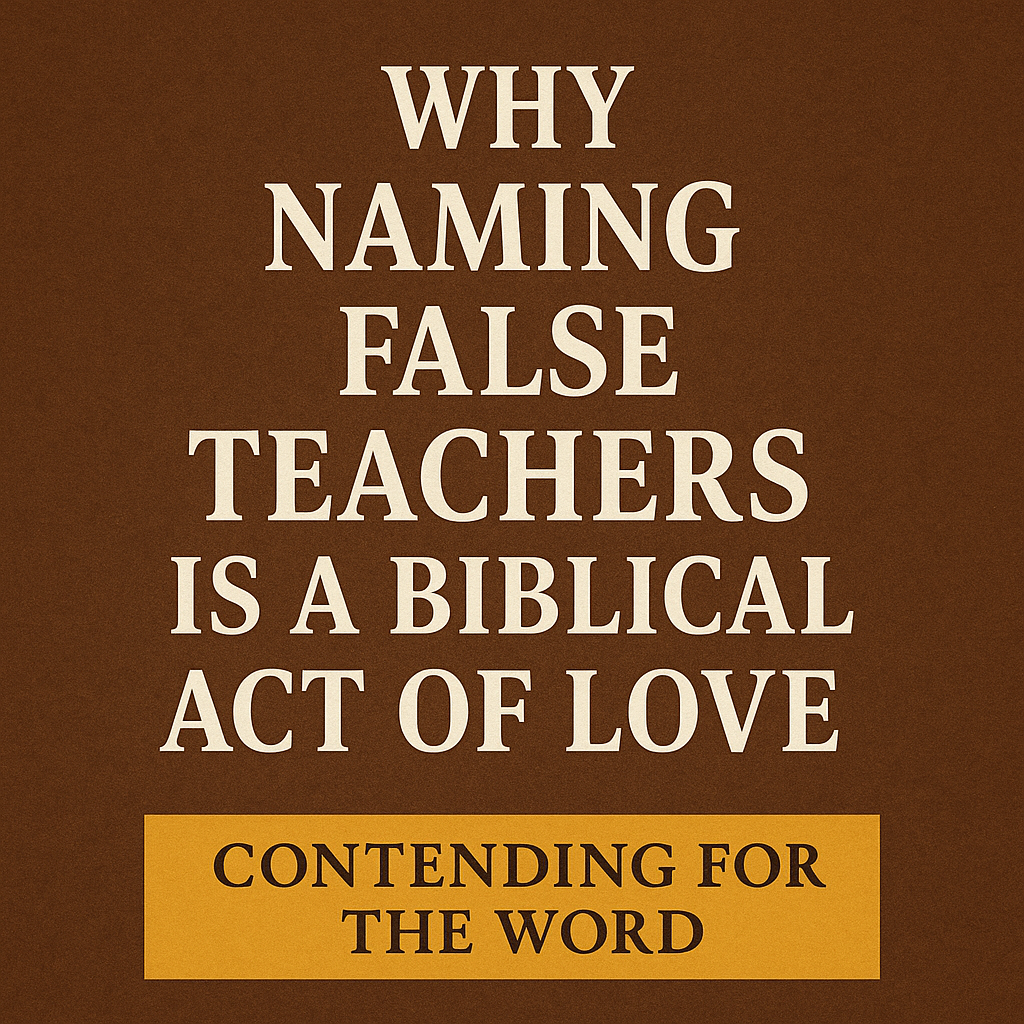⏱️ Estimated Reading Time: 4 min read
Why Naming False Teachers Is a Biblical Act of Love
Why Naming False Teachers Is a Biblical Act of Love
Contending for the Word – August 5, 2025
Written by Dave Jenkins
Is it unloving to name false teachers?
That’s a question many Christians are asking today, especially as false doctrine spreads across bookshelves, pulpits, and social media under the banner of love, grace, and unity. Some say naming names is divisive or harsh. Others insist it’s unchristlike. But what does Scripture actually teach?
The Biblical Pattern: Naming Names to Protect the Flock
From Genesis to Revelation, Scripture presents a God who loves His people by warning them of danger. In the New Testament, we see clear and sober examples where spiritual leaders publicly named individuals who were leading others astray.
The apostle Paul warned Timothy about Hymenaeus and Alexander, saying they had “made shipwreck of their faith” (1 Timothy 1:19–20). He named Demas for deserting him because he loved the world (2 Timothy 4:10). In 3 John, Diotrephes is rebuked for his pride and resistance to apostolic authority. The risen Christ Himself commended the church in Ephesus for not tolerating the deeds of the Nicolaitans (Revelation 2:6).
This is not cruel. It is love in action. By naming names, the apostles were not being petty or personal. They were protecting souls and preserving gospel truth.
Discernment Is Not the Same as a Judgmental Spirit
In a world that often confuses love with niceness and discernment with judgmentalism, Christians must be clear: to discern is not to condemn. Jesus commands us in John 7:24 to “judge with right judgment,” not by mere appearances. Paul urges believers to “take no part in the unfruitful works of darkness, but instead expose them” (Ephesians 5:11).
Discernment flows from a heart that loves truth, loves people, and hates deception. A judgmental spirit, by contrast, seeks to elevate self. But naming false teachers with biblical clarity and pastoral concern is never about ego. It is about guarding Christ’s sheep from wolves.
Silence Can Be Spiritual Neglect
If we believe the gospel is precious, and we do, then silence in the face of error is not a virtue. It is negligence. Pastors are called not only to teach sound doctrine but also to “rebuke those who contradict it” (Titus 1:9). Elders are commanded to watch over the flock “as those who will give an account” (Hebrews 13:17).
Paul did not cry out day and night with tears because he enjoyed conflict (Acts 20:29–31). He did so because he knew how easily the church could be led astray and how high the stakes truly are.
Tone, Truth, and the Glory of God
Some object to naming names not because they deny the need for truth, but because they fear the tone. Certainly, how we speak matters. We are to correct opponents with gentleness (2 Timothy 2:25). We must never slander or sensationalize. Our critiques should be clear, sober, biblical, and focused on truth, not personalities.
But even as we guard our tone, we must not muffle the truth. Love “rejoices with the truth” (1 Corinthians 13:6), and the truth about false teaching is that it destroys. When eternity is at stake, clarity is kindness, and silence is cruelty.
The Loving Courage to Stand Firm
Naming false teachers is not about platform-building or controversy-chasing. It is about shepherding. It is about protecting. It is about helping the church stay tethered to Christ and His Word.
The Church does not need more ambiguity. It needs truth spoken in love. And love that is real is never indifferent to the spiritual danger others face.
To name false teachers biblically, wisely, and with humility is not unloving. It is one of the most loving, faithful, and Christlike things we can do.
Check out more from Contending for the Word Q&A and also our Contending for the Word podcast at YouTube.
Dave Jenkins is happily married to his wife, Sarah. He is a writer, editor, and speaker living in beautiful Southern Oregon. Dave is a lover of Christ, His people, the Church, and sound theology. He serves as the Executive Director of Servants of Grace Ministries, the Executive Editor of Theology for Life Magazine, the Host and Producer of Equipping You in Grace Podcast, and is a contributor to and producer of Contending for the Word. He is the author of The Word Explored: The Problem of Biblical Illiteracy and What To Do About It (House to House, 2021), The Word Matters: Defending Biblical Authority Against the Spirit of the Age (G3 Press, 2022), and Contentment: The Journey of a Lifetime (Theology for Life, 2024). You can find him on Facebook, Twitter, Instagram, Youtube, or read his newsletter. Dave loves to spend time with his wife, going to movies, eating at a nice restaurant, or going out for a round of golf with a good friend. He is also a voracious reader, in particular of Reformed theology, and the Puritans. You will often find him when he’s not busy with ministry reading a pile of the latest books from a wide variety of Christian publishers. Dave received his M.A.R. and M.Div through Liberty Baptist Theological Seminary.




